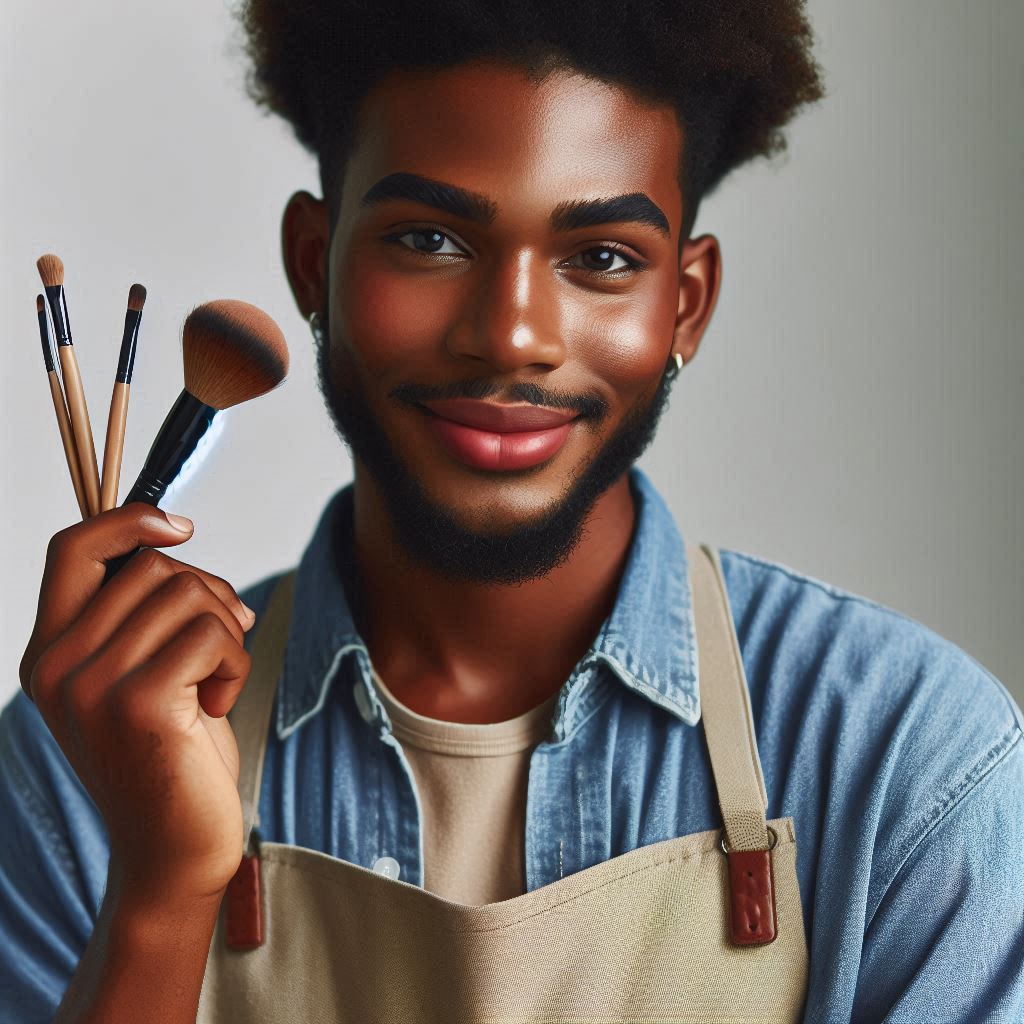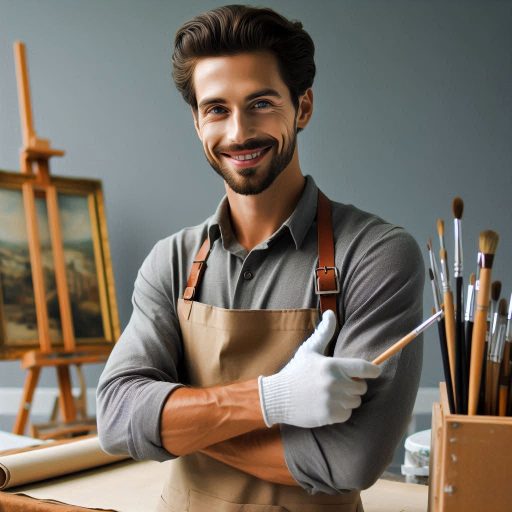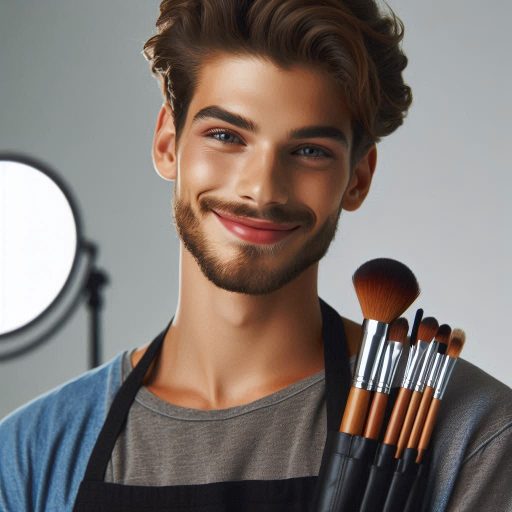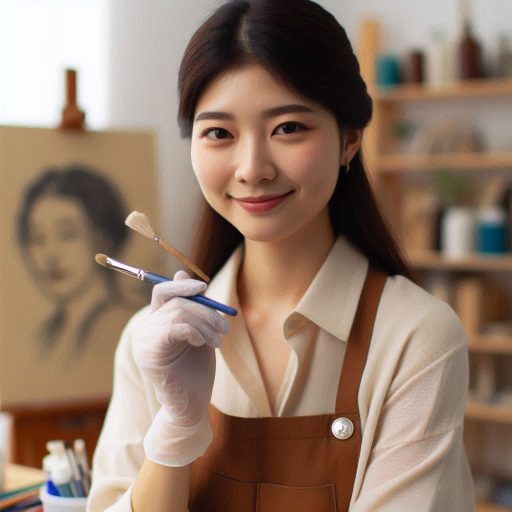Introduction
In the world of beauty and cosmetics, skills are paramount for aspiring makeup artists.
Mastering makeup artistry requires more than just creativity; it demands a specific skill set.
These skills can make a significant difference in one‘s success and reputation.
The beauty industry is highly competitive.
Each day, new trends emerge and more artists enter the field.
To stand out, aspiring makeup artists need to equip themselves with essential skills.
These skills not only help in delivering exceptional results but also in building a solid client base.
To excel, makeup artists must first perfect their technical skills.
This includes understanding various makeup techniques, mastering the use of different tools, and being proficient in applying makeup for diverse skin types and occasions.
Creativity and artistic vision are also crucial.
Artists need to think outside the box, experimenting with colors and styles to create unique looks.
Additionally, interpersonal skills play a vital role.
Building strong relationships with clients can lead to repeat business and referrals.
Communication skills help in understanding clients‘ needs and preferences, ensuring satisfaction with the final look.
Another key area is staying updated with industry trends.
The beauty industry evolves rapidly, and artists need to keep up with new products, techniques, and styles.
This continuous learning ensures that their skills remain relevant and competitive.
In this blog post, we will delve into these top skills every aspiring makeup artist should develop.
By honing technical abilities, nurturing creativity, improving interpersonal skills, and staying current with trends, artists can set themselves up for success in this dynamic industry.
Knowledge of Different Skin Types
Understanding different skin types is crucial for any aspiring makeup artist.
Transform Your Career Today
Unlock a personalized career strategy that drives real results. Get tailored advice and a roadmap designed just for you.
Start NowEach person‘s skin has unique needs, affecting how makeup should be applied.
Knowledge of skin types ensures the makeup looks flawless and lasts longer.
By tailoring techniques to individual skin characteristics, you can achieve the best results for every client.
Importance of Understanding Different Skin Types for Makeup Application
Recognizing and understanding different skin types is essential.
Skin can be oily, dry, combination, or sensitive.
Each type requires specific products and techniques.
For example, oily skin needs mattifying products to reduce shine.
Dry skin benefits from hydrating formulas to add moisture.
Knowing these nuances helps create a balanced and natural look.
How to Identify and Work with Different Skin Textures
To identify skin texture, observe the skin‘s surface.
Smooth skin may have fewer issues with makeup adherence.
Rough or flaky skin requires more preparation to ensure even application.
For oily skin, look for shine, especially in the T-zone.
Sensitive skin might show redness or irritation.
Test products and techniques that cater to these textures, ensuring the makeup adheres well and looks smooth.
Tips for Customizing Makeup Techniques for Various Skin Types
Customizing makeup techniques involves using the right products and methods.
For oily skin, use a primer that controls oil and a matte foundation.
For dry skin, opt for a hydrating primer and creamy foundation.
Sensitive skin needs hypoallergenic products that avoid irritation.
Adjust application methods too: use brushes or sponges that suit the skin texture.
Transform Your Career Today
Unlock a personalized career strategy that drives real results. Get tailored advice and a roadmap designed just for you.
Start NowAlways test products to ensure compatibility with the client‘s skin type.
In short, a deep understanding of skin types and textures helps in applying makeup effectively.
Tailoring your techniques ensures that every client looks their best and feels comfortable.
Read: How to Choose an Art Conservation Specialty
Color Theory and Application
When it comes to being a successful makeup artist, having a strong understanding of color theory and application is essential.
This knowledge will not only help you choose the right shades for different skin tones but also enable you to create beautiful, flawless looks for your clients.
Importance of Understanding Color Theory in Makeup Artistry
Color theory is the foundation of all makeup artistry.
It is the understanding of how colors work together to create harmonious and aesthetically pleasing looks.
By grasping the basics of color theory, you can create looks that enhance your client’s natural features and bring out their unique beauty.
How to Choose the Right Shades for Different Skin Tones
When selecting makeup shades for your clients, it is crucial to consider their skin tone.
Different skin tones require different shades to achieve the most flattering looks.
For example, individuals with warm undertones generally look best in colors with golden or peachy tones, while those with cool undertones may gravitate towards blue-based shades like pinks and purples.
One way to determine a client’s skin tone is by looking at the veins on their wrist.
If the veins appear green, they likely have warm undertones, whereas if the veins appear blue, they may have cool undertones.
By understanding how to assess skin tones and select the appropriate shades, you can create looks that enhance your client’s natural beauty.
Techniques for Blending and Layering Colors for a Flawless Finish
Blending and layering colors is a crucial skill for any makeup artist.
These techniques help create seamless transitions between different shades, ensuring a flawless and professional finish.
To achieve this, start by selecting colors that complement each other and gradually build up the intensity by layering and blending them together.
When blending colors, use a light hand and circular motions to soften any harsh lines and create a smooth gradient.
Layering colors involves strategically placing different shades to create depth and dimension.
Transform Your Career Today
Unlock a personalized career strategy that drives real results. Get tailored advice and a roadmap designed just for you.
Start NowBy mastering these techniques, you can create stunning makeup looks that showcase your skill and artistry.
In essence, color theory and application are essential skills for every aspiring makeup artist.
By understanding the principles of color theory, selecting the right shades for different skin tones, and mastering blending and layering techniques, you can create beautiful and flawless makeup looks that will impress your clients and set you apart in the industry.
Read: Balancing Art and Science in Conservation Work
Communication Skills
Effective communication is crucial for aspiring makeup artists.
It directly influences client satisfaction and the overall success of your work.
Importance of Effective Communication with Clients
Clear communication ensures you understand client needs and expectations.
It helps avoid misunderstandings and ensures the desired outcome.
Discussing details openly fosters a positive experience and builds client confidence.
Additionally, it allows you to address any concerns promptly and make adjustments as needed.
How to Assess and Understand Client Preferences
Begin by asking open-ended questions about the client‘s desired look and any specific requirements.
Listen actively to their responses and observe non-verbal cues.
Take notes on their preferences, skin type, and previous experiences.
Offering a visual reference, such as a portfolio or images, can help clarify their vision and refine your approach.
Tips for Building Rapport and Establishing Trust with Clients
Start with a warm greeting and a friendly demeanor to make clients feel comfortable.
Engage in casual conversation to establish a connection and show genuine interest in their needs.
Be attentive and responsive throughout the consultation and the makeup application process.
Consistently deliver high-quality results to build a reputation of reliability and skill.
Follow up after the appointment to gather feedback and address any issues, demonstrating your commitment to client satisfaction.
In summary, mastering communication skills is essential for any aspiring makeup artist.
Transform Your Career Today
Unlock a personalized career strategy that drives real results. Get tailored advice and a roadmap designed just for you.
Start NowBy understanding client preferences and building strong rapport, you lay the foundation for a successful and fulfilling career.
Effective communication not only enhances your professional relationships but also ensures that each client leaves satisfied and eager to return.
Read: How to Break into the Fashion Industry Without a Degree
Creativity and Innovation
Importance of creativity in makeup artistry
Creativity is the lifeblood of makeup artistry.
It allows artists to transform faces into canvases of imagination and style.
An inventive approach helps in creating unique looks that stand out and captivate audiences.
Without creativity, makeup artistry can become repetitive and uninspired.
How to stay inspired and think outside the box
Staying inspired and thinking outside the box is crucial for ongoing success.
Regularly exposing yourself to new art forms, fashion, and trends can fuel your creativity.
Visit galleries, attend fashion shows, and follow influential makeup artists on social media.
Immersing yourself in diverse experiences sparks new ideas and perspectives.
Tips for experimenting with new techniques and trends
Experimentation is key to mastering new techniques and trends.
Start by practicing innovative techniques on yourself or willing friends.
Use unconventional tools and products to discover novel effects.
Don’t be afraid to make mistakes‘they often lead to unexpected discoveries.
Stay updated with the latest trends by subscribing to beauty magazines and following industry leaders.
Try incorporating new color palettes, textures, and techniques into your work.
For instance, experimenting with bold eyeshadow combinations or unique contouring methods can yield impressive results.
Regularly challenge yourself with themed makeup looks or seasonal trends to push your boundaries.
Collaborate with other artists to share ideas and techniques.
Transform Your Career Today
Unlock a personalized career strategy that drives real results. Get tailored advice and a roadmap designed just for you.
Start NowIn essence, creativity and innovation are vital for any aspiring makeup artist.
They not only enhance your skills but also set you apart in a competitive field.
Embrace new experiences, stay curious, and continually experiment to elevate your artistry and make your mark.
Read: Historical Art Conservation Success Stories

Attention to Detail: Essential Skills for Aspiring Makeup Artists
In makeup artistry, precision and attention to detail are paramount.
These skills transform basic makeup into flawless artistry.
Every detail, from the tiniest brush stroke to color application, can make a significant difference.
A keen eye ensures that makeup enhances rather than overwhelms.
Importance of Precision and Attention to Detail in Makeup Application
Precision ensures that each feature is accentuated perfectly.
Incorrect application can lead to uneven or unnatural results.
Attention to detail also prevents mistakes like smudges or mismatched tones.
A makeup artist‘s reputation hinges on their ability to create polished, precise looks consistently.
How to Perfect Techniques Such as Eyeliner Application and Brow Shaping
Mastering eyeliner application requires steady hands and practice.
Use a fine brush or pencil for thin, controlled lines.
For winged eyeliner, steady your elbow on a surface to maintain a straight line.
Brow shaping demands careful attention to symmetry.
Use a brow pencil to fill in gaps and a spoolie brush to blend color.
Trim and tweeze with precision to shape brows neatly.
Tips for Achieving a Polished and Professional Look
Start with a clean, well-moisturized canvas.
Apply primer to create a smooth base.
Transform Your Career Today
Unlock a personalized career strategy that drives real results. Get tailored advice and a roadmap designed just for you.
Start NowChoose high-quality products for a seamless finish.
Blend foundation thoroughly to avoid streaks.
Pay close attention to blending eyeshadow to prevent harsh lines.
Finish with setting spray to lock in your look.
Regularly clean your tools to maintain hygiene and prevent mistakes.
Attention to detail is not just a skill but an art form. It elevates makeup from basic application to professional quality, making it an indispensable trait for any aspiring makeup artist.
Time Management
Importance of Effective Time Management
Time management is crucial for makeup artists working in a fast-paced industry.
Meeting deadlines, managing client appointments, and completing projects on time are essential for success.
Without proper time management, makeup artists may struggle to keep up with the demands of the industry and risk losing clients or opportunities.
Additionally, effective time management allows makeup artists to maximize their productivity and creativity, resulting in better quality work and a more successful career in the long run.
How to Prioritize Tasks and Stay Organized
One of the key aspects of effective time management is learning how to prioritize tasks and stay organized.
Create a to-do list each day, outlining all the tasks that need to be completed.
Prioritize tasks based on deadlines, importance, and client needs.
Break down larger projects into smaller, manageable tasks to help you stay focused and organized.
Utilize tools such as calendars, planners, or digital apps to keep track of deadlines and appointments.
By staying organized and prioritizing tasks effectively, makeup artists can ensure that they complete their work on time and deliver high-quality results to their clients.
Tips for Managing Multiple Clients or Projects Simultaneously
Managing multiple clients or projects simultaneously can be challenging, but with the right strategies, makeup artists can juggle multiple responsibilities effectively.
One tip is to set realistic deadlines for each client or project, allowing enough time to complete the work without feeling overwhelmed.
Communicate clearly with clients about your availability and schedule to avoid any conflicts.
Delegate tasks when necessary, such as hiring assistance for larger projects or events.
Transform Your Career Today
Unlock a personalized career strategy that drives real results. Get tailored advice and a roadmap designed just for you.
Start NowFinally, remember to take breaks and rest to avoid burnout and maintain your creativity and focus.
By implementing these tips, makeup artists can effectively manage multiple clients or projects simultaneously and succeed in the industry
Adaptability and Flexibility
In the makeup artistry world, adaptability and flexibility are essential.
Each setting presents unique challenges and demands.
An aspiring makeup artist must excel in these areas to succeed.
Importance of Being Adaptable in Different Makeup Settings
Makeup artists frequently work in diverse environments: from high-fashion photo shoots to intimate bridal parties.
Each setting requires a tailored approach.
Being adaptable ensures you can handle varying client needs and preferences seamlessly.
Flexibility in your technique and product choices is crucial for meeting the expectations of different environments and events.
Embracing change and quickly adjusting to new situations can set you apart in a competitive field.
How to Adjust Makeup Techniques for Different Lighting and Environments
Lighting profoundly impacts how makeup appears.
Natural light, studio lighting, and low light all alter color and texture.
Adjusting your techniques is vital.
For bright, natural light, use lightweight products to avoid a heavy appearance.
In dim or artificial lighting, opt for products that enhance features and avoid shadows.
Understanding how different environments affect makeup helps in creating a flawless look regardless of the setting.
Practice applying makeup under various lighting conditions to refine your skills.
Tips for Staying Calm and Focused Under Pressure
Makeup artists often work under tight schedules and high expectations.
Staying calm and focused is key to delivering quality work.
Plan your makeup application in advance and organize your tools efficiently.
Transform Your Career Today
Unlock a personalized career strategy that drives real results. Get tailored advice and a roadmap designed just for you.
Start NowDeep breathing exercises can help manage stress.
Maintain a positive attitude and remember your training.
Keeping a calm demeanor helps you stay precise and attentive, ensuring the best results for your clients.
Adaptability and composure under pressure will enhance your professional reputation and client satisfaction.
Mastering adaptability and flexibility will make you a standout makeup artist.
Embrace diverse settings, adjust techniques as needed, and stay calm under pressure to thrive in this dynamic field.
You Might Also Like: Top Curatorial Practices for Engaging Exhibits
Continuous Learning and Skill Development
Importance of staying updated on makeup trends and techniques
In the fast-paced beauty industry, staying updated on makeup trends and techniques is crucial.
Makeup artistry evolves rapidly, with new products and techniques emerging constantly.
Keeping abreast of these trends ensures your skills remain relevant and competitive.
Regularly exploring the latest styles helps you offer fresh, innovative looks to your clients, enhancing your professional reputation.
How to pursue further education and training in the beauty industry
To advance in the beauty industry, pursuing further education and training is essential.
Enroll in advanced makeup courses to deepen your knowledge.
Many institutions offer specialized programs, covering everything from advanced techniques to business management.
Workshops and masterclasses provide hands-on experience and insights from industry experts.
Additionally, online courses and webinars offer flexibility to fit learning into your busy schedule.
Tips for networking with other professionals and seeking mentorship
Networking with other professionals and seeking mentorship can significantly boost your career.
Join beauty industry associations and attend trade shows to connect with peers.
Engaging with others in your field provides valuable opportunities for collaboration and learning.
Finding a mentor in the beauty industry offers personalized guidance and support.
Transform Your Career Today
Unlock a personalized career strategy that drives real results. Get tailored advice and a roadmap designed just for you.
Start NowA mentor can share their experiences, provide feedback, and help navigate your career path effectively.
Incorporating these practices into your career strategy ensures you stay ahead of industry trends and continuously improve your skills.
Embracing lifelong learning and building a strong professional network not only enhances your expertise but also opens doors to new opportunities.
As an aspiring makeup artist, these efforts will pave the way for sustained growth and success in the beauty industry
Conclusion
As an aspiring makeup artist, it is crucial to acquire and hone these top skills to succeed in the industry.
These skills are the foundation of your career and will help you stand out in a competitive field.
Continuously developing your skills is key to staying relevant and meeting the demands of clients.
Pursuing your passion for makeup artistry requires dedication and commitment to learning and growing as an artist.
Remember, practice makes perfect, so don’t be afraid to experiment and push yourself outside your comfort zone.
Embrace challenges as opportunities for growth and improvement.
Keep up with the latest trends and techniques in the industry to stay ahead of the game.
By mastering these essential skills and continuously honing your craft, you will be well-equipped to build a successful career as a makeup artist.
Stay motivated, stay inspired, and never stop learning.
Your dedication will pay off in the long run, and you will achieve your dreams of becoming a sought-after makeup artist.
[E-Books for Sale]
The Big Book of 500 High-Paying Jobs in America: Unlock Your Earning Potential
$19.99 • 500 High-Paying Jobs • 330 pages
Explore 500 high-paying jobs in America and learn how to boost your career, earn more, and achieve success!
See All 500 High-Paying Jobs of this E-Book
1001 Professions Without a Degree: High-Paying American Jobs You Can Start Now
$19.99 • 1001 Professions Without a Degree • 174 pages
Discover 1001 high-paying jobs without a degree! Unlock career tips, skills, and success strategies for just $19.99!




